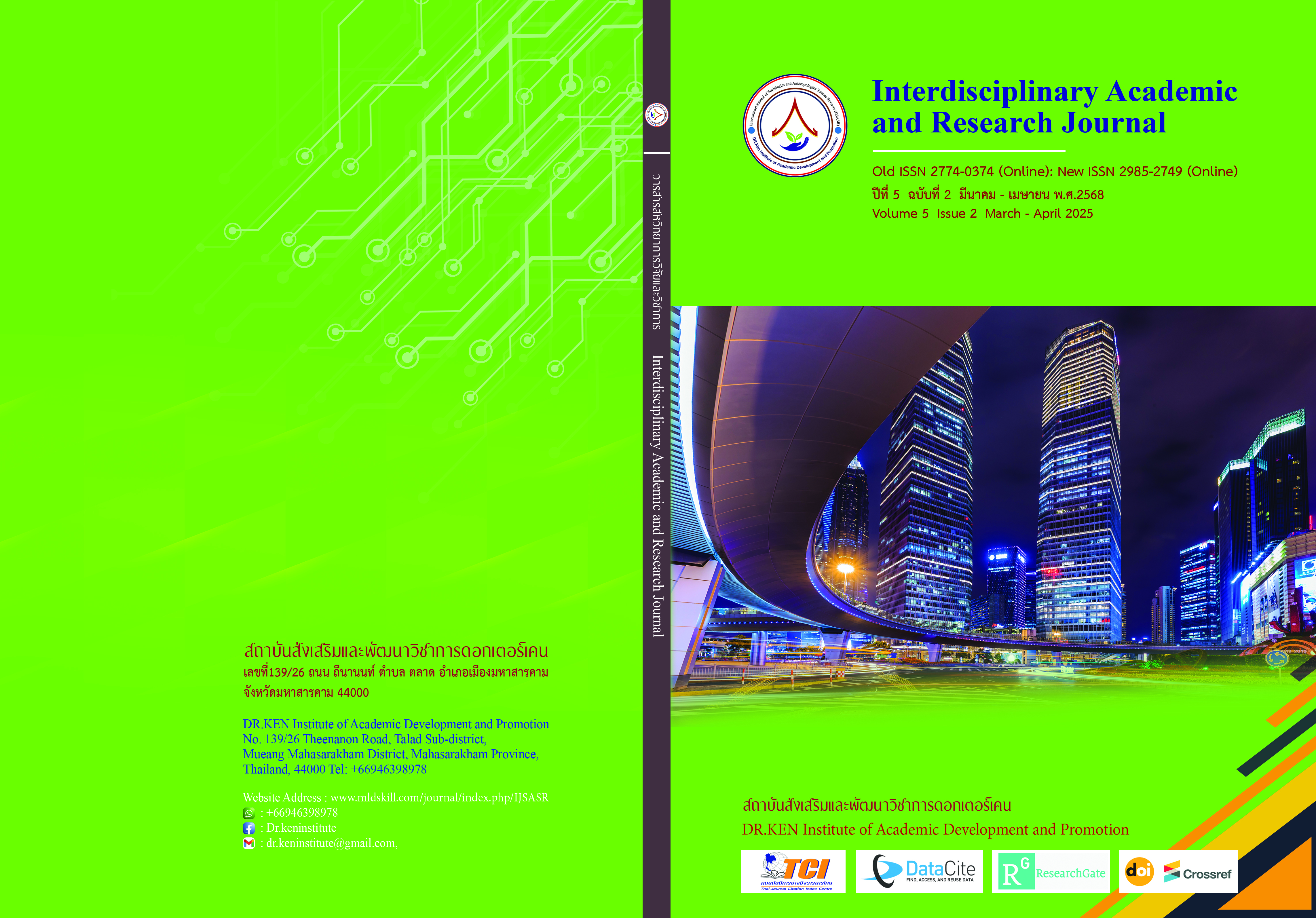Motivation to Enter the Postgraduate Program of COPAG
DOI:
https://doi.org/10.60027/iarj.2025.281259Keywords:
Motivation, Post-graduate Program, Political Science StudentsAbstract
Background and aims: Motivation is essential for pursuing graduate studies because it fuels perseverance and dedication to the challenges of advanced academic work. It also fuels a desire for research and personal development, ensuring long-term dedication to the chosen field. Thus, the objective of this study is to examine the motivation to enter into the postgraduate program of the College of Politics and Governance (COPAG), Mahasarakham University.
Methodology: The study used a mixed-method approach, combining quantitative and qualitative methods. The quantitative methodology involves administering an online questionnaire to 67 current graduate students on regular status at the College of Politics and Governance. The qualitative methodology included focus group interviews with ten current students drawn from a variety of student backgrounds. The data was analyzed using percentages, means, and standard deviations.
Results: The research results revealed the high-level motivations as follows: 1) Personal Motivation (4.47) Personal factors were found to be the most important for career advancement, including interest in the subject, personal interests, and a desire to build networks. 2) Institutional Motivation (4.33). The next most important factor was institutional motivation, which emphasized the value of knowledgeable and capable lecturers, the institution's reputation, and proximity to home. 3) Curriculum Motivation (4.31) focuses on curriculum quality, diverse teaching formats, and various types of learning support. The following additional moderate-level motivations were discovered. 1. Public Relations Channels (3.76) Information about the institution was most commonly obtained via social media platforms such as Facebook, Websites, and Line, followed by recommendations from acquaintances, public relations books/brochures, and an institutional open house event. 2) Economic factors (3.66). Economic motivations included the availability of scholarships (for research), cost savings on travel and lodging, and low tuition fees. 3) Influence of Other Related Persons (3.58). This included influence from friends and seniors, followed by close friends/teachers, parents, and family members. The focus group discussions identified several key motivators for enrolling in a postgraduate program, including skill development and career advancement, family expectations, networking opportunities, and study convenience.
Conclusion: The study found that personal motivation, driven by career advancement and personal interests, is the most important factor in pursuing graduate studies, followed by institutional reputation and curriculum quality. Moderate-level motivations include public relations channels, economic factors, and peer influence, with a focus on skill development, career advancement, and convenience.
References
กิตติยา เพชรดี. (2559). แรงจูงใจในการศึกษาต่อระดับปริญญาโทของนิสิตคณะภูมิสารสนเทศศาสตร์ มหาวิทยาลัยบูรพา. งานนิพนธ์บริหารธุรกิจมหาบัณฑิต : มหาวิทยาลัยบูรพา.
จริยาภรณ์ โตเผือก. (2562). ปัจจัยที่มีผลต่อการศึกษาต่อระดับบัณฑิตศึกษาของนักศึกษาปริญญาโท มหาวิทยาลัยราชภัฏหมู่บ้านจอมบึง. วารสารการบริหารและการจัดการ. 7(2), 56-63.
จุรีรัตน์ เสนาะกรรณ, และวีรวรรณ จงจิตร ศิริจิรกาล. (2562). ปัจจัยที่ส่งผลต่อการตัดสินใจเลือกเข้าศึกษาต่อระดับบัณฑิตศึกษา มหาวิทยาลัยราชภัฏนครศรีธรรมราช. วารสารAL-NUR บัณฑิตวิทยาลัมหาวิทยาลัยฟาฏอนี. 14(27), 94-106.
นิตยา กวีนัฎธยานนท์. (2556). ปัจจัยที่มีผลต่อการตัดสินใจศึกษาต่อระดับปริญญาโทของนักศึกษาระดับปริญญาตรี มหาวิทยาลัยรามคำแหง .ปริญญานิพนธ์ปริญญามหาบัณฑิต : มหาวิทยาลัยรามคำแหง.
พีระ พันธุ์งาม, ณัฐวัชต์ บุญภาพ, ธัญลักษณ์ ครึ่งธิ, และสุลีมาศ คำมุง. (2559). การตัดสินใจศึกษาต่อในระดับบัณฑิตศึกษา. วารสารวิชาการสถาบันวิทยาการจัดการแห่งแปซิฟิค. 2(1), 121-127.
มนต์ชัย วงษ์กิตติไกรวัล. (2563, 12 มกราคม). การเรียนปริญญาโท ยังจำเป็นอยู่หรือเปล่าในปี 2020? Workpoint Today. https://workpointtoday.com/article-on-graduate-school/?fbclid=IwY2xjawE9bRpleHRuA2FlbQIxMAABHeqZDks5qnqkL3m0Ef-FDmMWo4G-iyiGvF_JntA7UkAAr_1eOWkwa3qQKw_aem_PF8ctIVsnuLr3FHQ8V7v1A
มะลิวัลย์ สินน้อย ปวีณา คําพุกกะ และสยุมพร บุญไชย. (2564). แรงจูงใจในการเข้าศึกษาต่อมหาวิทยาลัยอุบลราชธานี. วารสารมนุษยศาสตร์และสังคมศาสตร์. (2(2), 88-100.
สมฤทัย ไทยนิยม. (2556). แรงจูงใจในการศึกษาต่อระดับปริญญาโทของข้าราชการกรมพัฒนาพลังงานทดแทนและอนุรักษ์พลังงาน .ปริญญานิพนธ์ปริญญามหาบัณฑิต : มหาวิทยาลัยศรีปทุม.
อาภรณ์ เชี่ยวชาญเกษตร. (2551). เหตุจูงใจในการเข้าศึกษาต่อระดับบัณฑิตศึกษาของนักศึกษาปริญญาโท คณะเทคโนโลยีสารสนเทศ มหาวิทยาลัยเทคโนโลยีพระจอมเกล้าธนบุรี .ปริญญานิพนธ์ปริญญามหาบัณฑิต : มหาวิทยาลัยเทคโนโลยีพระจอมเกล้าธนบุรี.
เอกลักษณ์ นาคพ่วง. (2562). แรงจูงใจในการศึกษาต่อระดับมหาบัณฑิตของนักศึกษาสาขาวิชารัฐศาสตร์ มหาวิทยาลัยราชภัฏนครสวรรค์. วารสาร มจร สังคมศาสตร์ปริทรรศน์. 8(3), 244-254.
Downloads
Published
How to Cite
Issue
Section
License
Copyright (c) 2025 Interdisciplinary Academic and Research Journal

This work is licensed under a Creative Commons Attribution-NonCommercial-NoDerivatives 4.0 International License.
Copyright on any article in the Interdisciplinary Academic and Research Journal is retained by the author(s) under the under the Creative Commons Attribution-NonCommercial-NoDerivatives 4.0 International License. Permission to use text, content, images, etc. of publication. Any user to read, download, copy, distribute, print, search, or link to the full texts of articles, crawl them for indexing, pass them as data to software, or use them for any other lawful purpose. But do not use it for commercial use or with the intent to benefit any business.
















.png)


